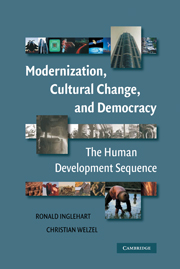Book contents
- Frontmatter
- Contents
- Dedication
- Acknowledgments
- Foreword by Hans-Dieter Klingemann
- Introduction
- PART I THE FORCES SHAPING VALUE CHANGE
- PART II THE CONSEQUENCES OF VALUE CHANGE
- 7 The Causal Link between Democratic Values and Democratic Institutions: Theoretical Discussion
- 8 The Causal Link between Democratic Values and Democratic Institutions: Empirical Analyses
- 9 Social Forces, Collective Action, and International Events
- 10 Individual-Level Values and System-Level Democracy: The Problem of Cross-Level Analysis
- 11 Components of a Prodemocratic Civic Culture
- 12 Gender Equality, Emancipative Values, and Democracy
- 13 The Implications of Human Development
- Conclusion: An Emancipative Theory of Democracy
- Bibliography
- Index
12 - Gender Equality, Emancipative Values, and Democracy
Published online by Cambridge University Press: 05 September 2012
- Frontmatter
- Contents
- Dedication
- Acknowledgments
- Foreword by Hans-Dieter Klingemann
- Introduction
- PART I THE FORCES SHAPING VALUE CHANGE
- PART II THE CONSEQUENCES OF VALUE CHANGE
- 7 The Causal Link between Democratic Values and Democratic Institutions: Theoretical Discussion
- 8 The Causal Link between Democratic Values and Democratic Institutions: Empirical Analyses
- 9 Social Forces, Collective Action, and International Events
- 10 Individual-Level Values and System-Level Democracy: The Problem of Cross-Level Analysis
- 11 Components of a Prodemocratic Civic Culture
- 12 Gender Equality, Emancipative Values, and Democracy
- 13 The Implications of Human Development
- Conclusion: An Emancipative Theory of Democracy
- Bibliography
- Index
Summary
Gender Equality as an Aspect of Human Development
The rise of gender equality is another aspect of the process of human development that is comparable in importance to the global trend toward democracy and closely linked with it. Since the dawn of history, women have had an inferior social position in virtually every society. The role of women was largely limited to the functions of reproduction and caretaking; public decision making and political power were predominantly male domains (Daly, 1978; Ember and Ember, 1996: 124; Nolan and Lenski, 1999: 102; Fulcher and Scott, 2003: 164–68). Even today, men still dominate most areas of economic and public life.
But in the postindustrial phase, a trend toward gender equality becomes a central aspect of modernization (Inglehart and Norris, 2003: 29–48). This transformation of established gender roles is part of a broader humanistic shift linked with rising self-expression values, bringing increasing tolerance of human diversity and antidiscrimination movements on many fronts (see Fulcher and Scott, 2003: 179–91).
Gender equality has become crucial to the quality of democracy. Democracy is based on the idea that all human beings are valuable, regardless of biological characteristics such as race and sex (Birch and Cobb, 1981; Rose, 1995; Sen, 1999; Dahl, 2003). The idea of democracy aims at empowering people as if societies were made through a social contract between equals, all of whom have the same potential for making autonomous and responsible choices (Sen, 1999: chap. 6).
- Type
- Chapter
- Information
- Modernization, Cultural Change, and DemocracyThe Human Development Sequence, pp. 272 - 284Publisher: Cambridge University PressPrint publication year: 2005



